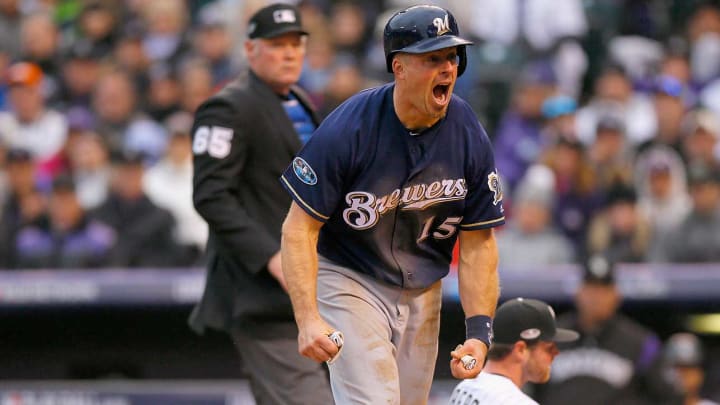Brewers Sweep Rockies to Reach First NLCS Since 2011

Sunday’s NLDS Game 3 was a must-win for the Colorado Rockies, down 0-2 in the series against the Milwaukee Brewers. They couldn’t pull it off. The Brewers got a solid outing from starter Wade Miley, followed by a characteristically strong performance from their bullpen, and there was simply no response.
Milwaukee got on the board early, with one run in the first inning, and they never held off. Taking a 4-0 lead into the ninth, they used the final frame to tack on two more, with back-to-back home runs from Orlando Arcia and Keon Broxton. The Brewers now go to the NLCS, and the Rockies go home. Here are three thoughts on Milwaukee’s 6-0 win:
Colorado’s Silent Bats
The Rockies’ offense has been eerily quiet all week. They scored just two runs apiece in the tiebreaker, the wild card game and Game 1 of the NLDS before getting shut out in Game 2. They didn’t fare any better in Game 3. Now, there was a crucial difference here—that is, besides the do-or-die stakes on Sunday. Those first four games were on the road, where Colorado’s bats have struggled all year. Game 3 was, finally, at Coors Field. Their .852 OPS at Coors Field was better than any team’s home offense. Their .665 OPS on the road was 27th out of 30th. That is, to some extent, just how it goes for any team whose home is Coors; to this extent, though, is extreme. But Sunday’s return home didn’t deliver the offensive boost that the team was looking for.
Inside the At-Bat That Led to Jesús Aguilar’s Breakout With the Brewers
The Rockies notched three hits against Miley, only one for extra bases. They got just one against Milwaukee’s elite bullpen, and even that was arguable. (A Trevor Story double that popped in and out of Christian Yelich's glove, which could easily have been scored as an error.) There haven’t been any bright spots for their offense in this series—the team only scored in one inning, out of 28—but Sunday’s Game 3 felt especially the darkest. Nolan Arenado ended the NLDS 2-for-11; Charlie Blackmon was 1-for-12; Trevor Story was 2-for-12. The Rockies were 1-for-15 with runners in scoring position. Their bats could never get going, and they paid dearly for it.
A Nightmarish Sixth Inning for Scott Oberg
Colorado’s situation looked bleak heading into the sixth inning, down 2-0. It looked even worse soon after.
The Rockies had Scott Oberg on the mound, one of the few solid options from their bullpen. He began with a strikeout of Jesús Aguilar. Then, things took a turn. A first-pitch single to Mike Moustakas. A double to Erik Kratz. (Erik Kratz?) A second out, mercifully, in a strikeout of Arcia. And next, perhaps the most capricious of baseball’s rules: the balk. Oberg went to flip the ball from his glove to his hand, a motion that he’s likely pulled off thousands of times without error. This time, he dropped it. The price? A run.
The @Brewers plate another run on a #Rockies balk. #NLDS pic.twitter.com/FdriQFLs2d
— MLB Network (@MLBNetwork) October 7, 2018
His struggle wasn’t over. With the same batter, Curtis Granderson, still in the box, Oberg threw a wild pitch. Another run scored. Oberg was able to strike out Granderson to end the inning, but the damage was done. The Rockies’ deficit had doubled with two brutal mistakes—small, almost thoughtless, motions when considered on their own; fatal when taken together.
Erik Kratz Is Here
Kratz received more plate appearances this season than in any other year of his major league career. This had nothing to do with his offensive performance (poor, per usual) and everything to do with his skills as a top-tier defensive catcher, which prompted Milwaukee to trade for him in May. The 38-year-old back-up backstop hit this season just like you’d expect from anyone with that description, which is to say that he had a .634 OPS.
Will the @Brewers sweep the #NLDS?
— MLB Network (@MLBNetwork) October 7, 2018
Watch the final innings on MLB Network! pic.twitter.com/xpeuToOGOr
Kratz didn’t play in Game 1. He was 2-for-4 in Game 2. He was 3-for-4 in Game 3. In 67 regular season games this year, Kratz had 48 hits. In two playoff games, he has five, with two runs batted in and a double. It makes no sense—which is exactly why it’s perfect for October.
